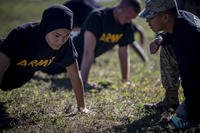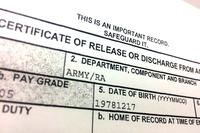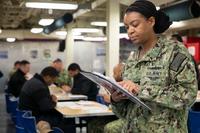Thinking of joining the Marine Corps? Want to know what it takes and what types of jobs in the Marine Corps are available? Get the lowdown in this fact sheet.
Marine Corps Basics
The Marine Corps has a total active-duty force of about 184,000, as of early 2020.
Directory of Marine Corps bases -- Get a feel for the Marine Corps community with this directory of Marine Corps bases around the country.
The latest news on the military, including the Marine Corps -- All the latest headlines about life in the Marine Corps and the military.
Marine Corps equipment guide -- From the Beretta M9 pistol to the Stryker combat vehicle, get the details on the equipment used by the Marine Corps.
Joining the Marine Corps
Marines can serve as a full-time, active-duty service member or as a member of the Marine Corps Reserve.
Active duty is similar to working at a full-time civilian job. You will have your own military occupational specialty (MOS), and you will fill a specific role within your unit. Your length of service may range from 2-6 years. Active-duty members fall into two general categories: enlisted personnel and officers.
Enlisted Marines
Enlisted Marines are the backbone of the Marine Corps, with each member having his or her own specialized training and filling a role within his or her unit. Officers are the Marine Corps' leaders. They guide enlisted Marines during missions and provide the know-how and expertise to get the job done. Active-duty service terms typically last 2-6 years. Deployment can last up to a year, but the length may vary depending on a unit's specific mission. Marines are eligible for a two-week rest and relaxation (R&R) leave after six months of deployment.
Military officer programs
There are three paths to becoming a Marine Corps officer. The Marine Corps does not offer direct commissions for specialized jobs.
Marine Corps ROTC -- The Naval Reserve Officers Training Corps (NROTC) allows students to enroll in elective leadership and military courses at colleges and universities. At graduation, NROTC cadets are commissioned as second lieutenants. For more details, see the ROTC section in this article.
Officer Candidate School -- Officer Candidate School allows college graduates to gain the knowledge and skills necessary to be commissioned as Marine Corps officers. Through classroom instruction and training exercises, candidates learn to become leaders.
U.S. Military Academy -- Students must receive a nomination from a member of Congress to be admitted into the U.S. Naval Academy. On top of military training, the school offers 22 majors. Graduates from the academy receive their commission as second lieutenants in the Marines.
Serving in the Marine Corps Reserve is similar to working a part-time job. You can live where you want, focus on your civilian career and stay close to your family. You also will have access to many of the benefits of active-duty Marines, but your time spent on duty is decreased greatly. In the Reserve, you will spend one weekend a month in training and two weeks a year attending a field training exercise (FTX). Marines in the Marine Corps Reserve may be called to active duty to provide their expertise. Your service in the Marine Corps Reserve may range from 3-6 years, depending on your Marine Corps Reserve job.
Marine Corps Careers
Marine Corps jobs -- Search the Marine Corps' database of available careers for enlisted, officer and Reserve members.
Special careers in the Marine Corps
Below is official information about specialized careers in the Marine Corps.
Ground ordnance/ammunition & explosive ordnance disposal
Joining the ROTC
The Reserve Officer Training Corps (ROTC) is an elective for undergraduate and graduate students that provides leadership training. Available at more than 1,100 colleges and universities nationwide, it offers merit-based scholarships that can pay up to the full cost of tuition and open educational opportunities.
High school students
If you're a high school junior or senior and are interested in enrolling in Marine Corps ROTC, you can find more information here.
College students
If you're interested in enrolling in Marine Corps ROTC and you are in college, start by talking to the Marine Corps ROTC enrollment officer on your campus about taking the Marine Corps ROTC basic elective course and about the incentives available, including opportunities to compete for two-, three-, or four-year merit-based scholarships.
Junior college and graduate students
If you have two years remaining in junior college or graduate school, you are still eligible to enroll in Marine Corps ROTC. Talk to the Marine Corps ROTC enrollment officer on your campus.
Ready to Join the Marines?
We can put you in touch with recruiters from the different military branches. Learn about the benefits of serving your country, paying for school, military career paths, and more: sign up now and hear from a recruiter near you.
















